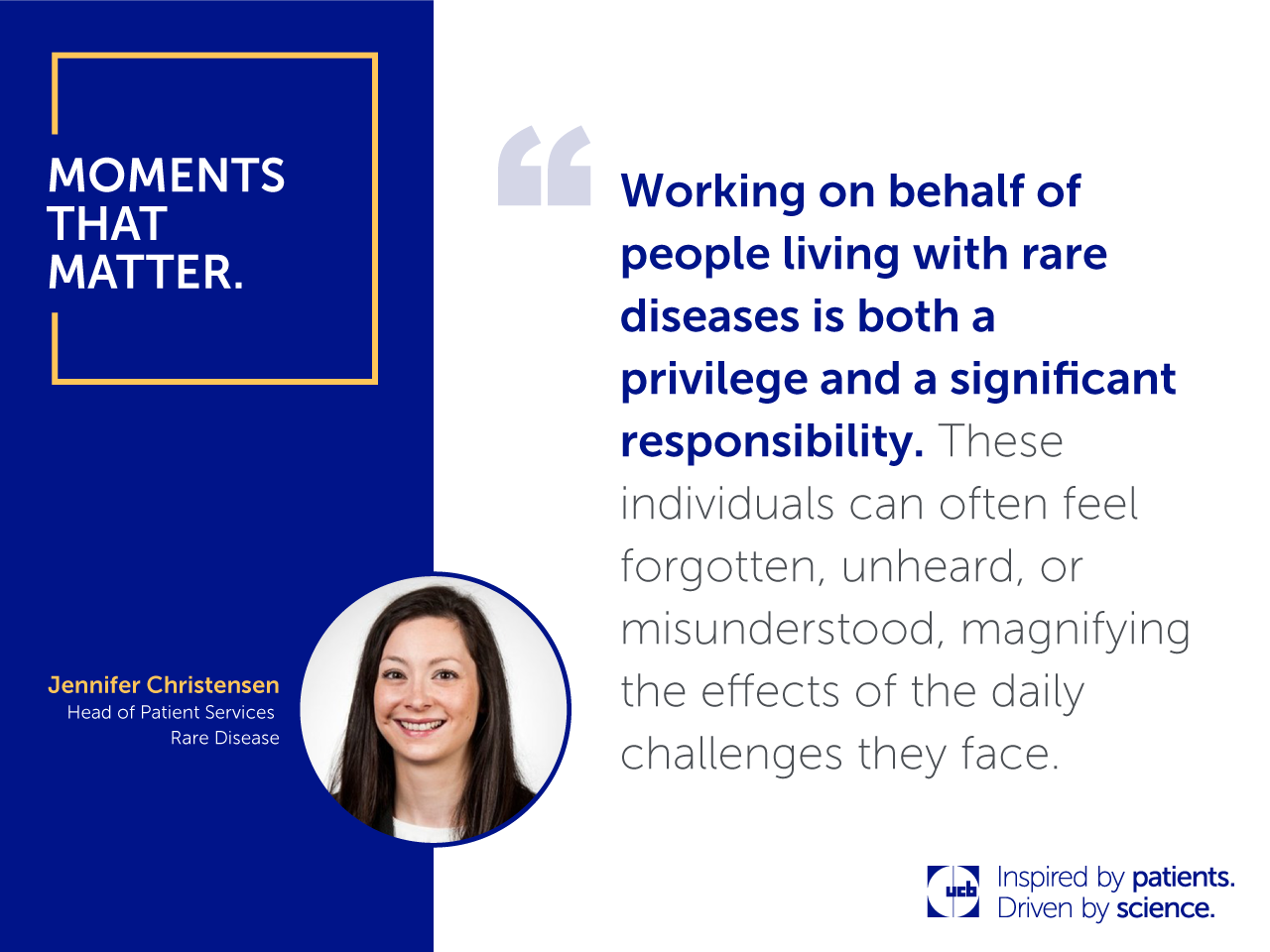
Working on behalf of people living with rare diseases is both a privilege and a significant responsibility. These individuals can often feel forgotten, unheard, or misunderstood, magnifying the effects of the daily challenges they face. That is why, when UCB decided to bring our expertise to the rare disease space, we knew we were going to do Rare differently.
Jen Christensen, Head of Patient Services for Rare Diseases at UCB, is an industry veteran when it comes to working with people living with challenging conditions.
We had a chance recently to have a Q&A with Jen and dive into what it takes to connect with patients and their caregivers, to offer support, education, and resources to help navigate their rare disease journey.
Q) Understanding the challenges rare disease patients face each day is critical to making sure we’re delivering the help they need. How is UCB taking on this responsibility when it comes to rare diseases?
A) The greatest needs can’t always be measured in numbers. At UCB, we don’t just see patients or population sizes, we see people in need. Working in rare diseases is different – smaller patient populations that are harder to find, harder to treat, and need a higher level of support.
We are committed to helping patients navigate their journey through our patient support programs that are designed to offer personalized support, education, and resources.
Additionally, we are working towards expanding the access of every patient to their very own Care Coordinator—who will remain a constant support resource throughout their entire treatment journey.
Q) What about the caregiver? They are so integral to supporting people living with a rare disease.
A) Lately, I have been pondering about being a care-partner versus a care-giver, because it really is about collaboration and partnership, to support patients.
We're focused on not only the patient component, but also the person and community component, and that includes families and caregivers. We want to partner with the caregiver community to create programs that the community actually wants.
UCB aims to provide the same level of personalized support to caregivers, as much as to patients, and we are working towards developing tools and resources to expand caregiver education. One thing I am most excited about is the diversity, equity, and inclusion component and having the materials we develop be bilingual, both in Spanish and English languages.
To better understand the rare disease patient experience, we’re also learning from our patient listening sessions. The conversations we have with them give us access to information that no academic research into the mechanics of disease can offer, because we know that the cost of the disease is often more than just what’s happening physiologically – it’s also the mental toll it takes on patients, caregivers, and their families.
Q) How is UCB supporting care for people living with a rare disease?
A) As we continue to understand more about how people living with rare conditions such as myasthenia gravis (MG), we hope to offer tools and resources to address financial, social, and emotional needs, where possible/applicable. As an example, we are working towards introducing telecoaching support for patients who have questions, and we’re also looking at ways we can augment care with motivational or lifestyle assistance to make the holistic patient experience better on a psychological or emotional level.
Really, it is about establishing authentic relationships with patients, so they know there’s another group of passionate people on their side, supporting them on their Rare journey.
Q) How is UCB going above and beyond for people living with myasthenia gravis?
A) I think what sets us apart is our culture of dedication and our focus on people. By listening, we can understand patients’ needs, and that understanding of patients’ needs is a value that is held deeply across the entire company, not just in divisions that are explicitly tasked with patient-facing work.
For instance, we’re creating empathy workshops that will be attended not just by patient-facing teams, but also by our sales and marketing teams, our field teams, and our reimbursement executives. We want to make sure that the focus isn’t just on what we’re doing for people living with MG but on why we’re doing it for them. We want to emphasize showing up with empathy because it’s the Moments That Matter, and they are really true to the work that we’re doing for patients and their caregivers.
The content of this article is intended for a U.S. audience only.
©2023 UCB, Inc., Smyrna, GA 30080. All rights reserved. US-N-DA-MG-2200002
Choose Country
- Global Site – English
- Australia – English
- België – Engels
- Belgique – Anglais
- Brasil – Português
- България – Български
- Canada – English
- Canada – Français
- 中国 – 中文
- Česká Republika – Angličtina
- Danmark – Engelsk
- Deutschland – Deutsch
- France – Français
- España – Español
- Ελλάδα – Ελληνικά
- India – English
- Ireland – English
- Italia – Inglese
- 日本 – 日本語
- Казахстан – ағылшын тілі
- 한국 – 한국어
- Luxembourg – Anglais
- Luxemburg – Engels
- Magyarország – Angol
- México & Latinoamérica – Español
- Nederland – Engels
- New Zeeland – English
- Norge – Engelsk
- Österreich – Deutsch
- Polska – Polski
- Portugal – Inglês
- România – Engleză
- Россия – Русский
- Slovensko – Anglický
- Suomi – Englanti
- Sverige – Engelska
- Schweiz – Deutsch
- Suisse – Français
- Türkiye – Türkçe
- Україна – Англійська
- United Kingdom – English
- U.S.A. – English


